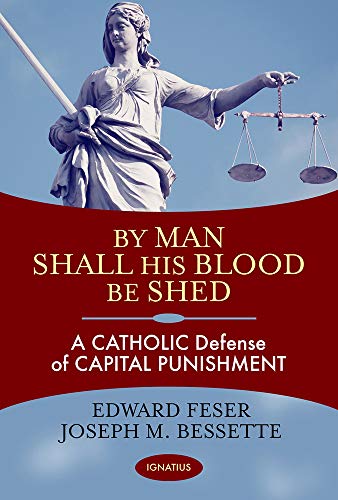By Man Shall His Blood Be Shed
A Catholic Defense of Capital Punishment
Edward Feser; Joseph Bessette
BOOK REVIEW

In the arena of ethical debates, few topics ignite as much passion and fury as the question of capital punishment. By Man Shall His Blood Be Shed: A Catholic Defense of Capital Punishment by Edward Feser and Joseph Bessette dives headfirst into this contentious issue, illuminating the intricacies of moral philosophy, justice, and the role of the state in administering penalties for the gravest of crimes. This profound tome challenges readers to confront their preconceived notions about morality, justice, and the purpose of punishment in contemporary society.
Capital punishment has historically been a hotbed of conflicting beliefs, evoking fierce loyalty among proponents and staunch opposition from its detractors. Feser and Bessette do not shy away from addressing the uncomfortable truths that lie at the heart of this debate. With a compelling blend of rigorous theological analysis and philosophical argumentation, they skillfully weave a narrative that demands your attention. Their positions may provoke anger, sorrow, or even a sense of moral superiority, depending on where you stand on the issue. The authors argue emphatically, invoking the Catholic tradition to bolster their assertion-namely, that capital punishment is not only permissible but, at times, necessary for justice to prevail.
Threading through an exploration of Scripture and Church teachings, the authors offering readers an invitation-no, a challenge-to grapple with the profound implications of their arguments. Imagine feeling your convictions tested as you navigate the pages laden with theological citations and philosophical inquiries. This work compels you to ponder fundamental questions about human dignity, retributive justice, and the moral calculus that drives our legal systems.
Feser and Bessette's narrative does not exist in a vacuum; it resonates deeply against the backdrop of current societal dilemmas. In an age where justice often feels elusive and morally ambiguous, the book serves as a clarion call, urging readers to reconsider the very foundations of their beliefs. It is a mirror reflecting our cultural attitudes towards crime and punishment, revealing the stark contrast between the secular and the sacred.
Reader responses to the book are as polarized as the issue it tackles. While some hail it as a spirited and well-reasoned defense, others leap to critique it as a relic of outdated thinking. Supporters find solace in the authors' compelling mix of faith and reason, arguing that it provides a necessary theological grounding for the harsh realities of governance. On the flip side, critics argue it reinforces a punitive mindset that may lack compassion and restorative justice principles. The tension in these responses showcases the raw divisiveness of the topic, leaving no room for ambivalence or lukewarm feelings.
Plunge deeper into the text, and you encounter not just theological arguments but poignant reflections on the nature of sin and redemption. Feser and Bessette evoke a Catholic understanding of justice that embraces both punishment and mercy. As you read, the emotional weight of their words invites tears of hope or uncertainty, stirring a longing for a more nuanced conversation about morality and retribution.
The authors are not merely philosophers issuing a proclamation; they are passionate participants in the dialogue that surrounds the complexities of human dignity and societal order. They embody the spirit of impassioned discourse, asking us to look beyond our biases and engage with the essence of life, death, and justice. The stakes are uncomfortably high, leaving readers with the unsettling question: can the ends truly justify the means in the face of moral absolutes?
As you wrestle with the arguments laid bare in this book, you may find yourself transformed. Feser and Bessette hold a magnifying glass to the fundamental beliefs that drive our legal systems, challenging each of us to reflect on the morality of our convictions. This isn't just a book-it's a psychological and spiritual journey, peeling back layers of emotion to reveal the raw, pulsating heart of justice itself.
Ultimately, By Man Shall His Blood Be Shed stands as a vital contribution to an enduring debate, one that transcends borders and cultures. It's not merely an academic exercise; it's an invitation to engage, to ponder deeply, and-perhaps most importantly-to feel. The complex tapestry woven by the authors leaves you questioning everything you thought you knew about justice, morality, and the human experience. Dare to delve into these pages, and you may emerge not only with a greater understanding of capital punishment but with a newfound empathy for the fragile balance of mercy and justice in our world. 🌍
📖 By Man Shall His Blood Be Shed: A Catholic Defense of Capital Punishment
✍ by Edward Feser; Joseph Bessette
🧾 424 pages
2017
#shall #blood #shed #catholic #defense #capital #punishment #edward #feser #EdwardFeser #joseph #bessette #JosephBessette